Why the American experiment "Biosphere-2" failed, which could change the world
Categories: Science
By Pictolic https://pictolic.com/article/why-the-american-experiment-biosphere-2-failed-which-could-change-the-world.htmlToday, life simulation programs on On Mars, they are more relevant than ever. Hundreds of people in different parts of the world live in strange boxes in the middle of wastelands and walk on the sands in spacesuits, trying to feel the delights of life outside Mother Earth. But all this is childish babble compared to the tests that a group of Americans subjected themselves to during the ambitious experiment "Biosphere-2".
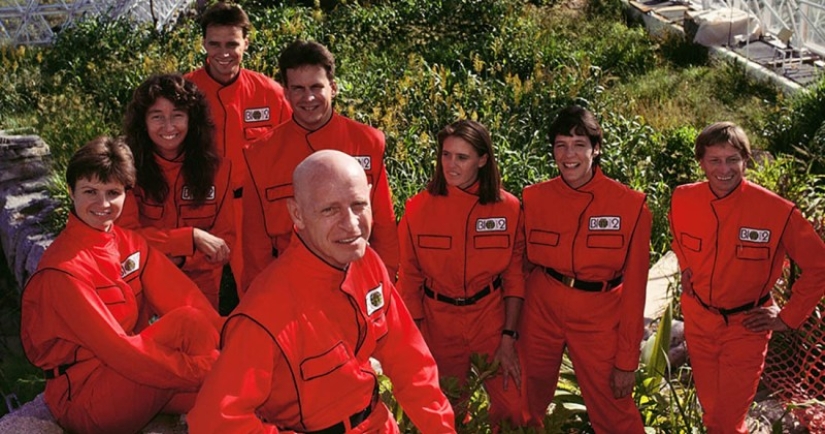
At the end of the 80s of the last century, billionaire and philanthropist Edward Bass allocated $ 30 million for the implementation of a project that haunted him for many years. Bass dreamed of finding out whether a person could survive in an artificial closed biosystem without contact with the outside world.
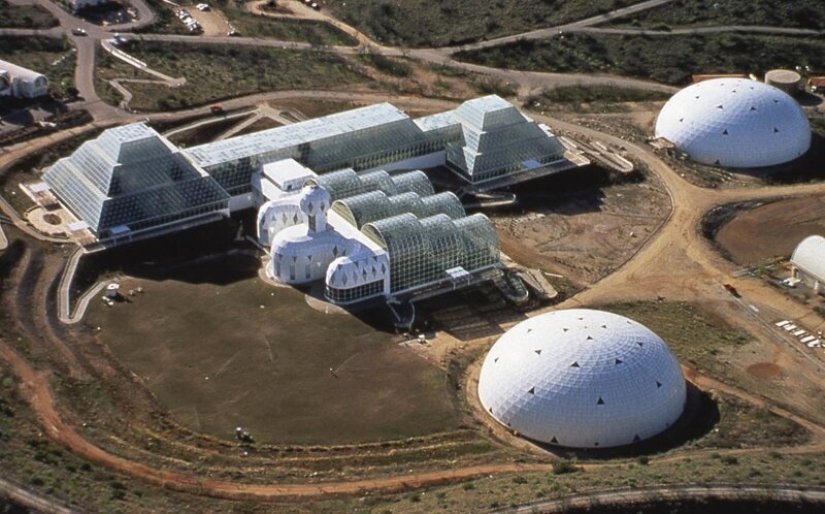
A nuclear winter, a global environmental catastrophe, the colonization of distant planets — in all these situations, a workable closed system could provide a high-quality and safe life for humanity or the best part of it. Therefore, the rich man did not stint for the common cause and decided to invest in the implementation of the Biosphere-2 project, which is incredible in scale and no less daring.
For the experiment, an extensive scientific town was built in the Arizona desert, in which there were several pavilions. Under the sealed domes there was a small copy of the biosphere of our planet, namely, five natural locations: an ocean with a coral reef, a savanna, a jungle, a desert and a swamp.
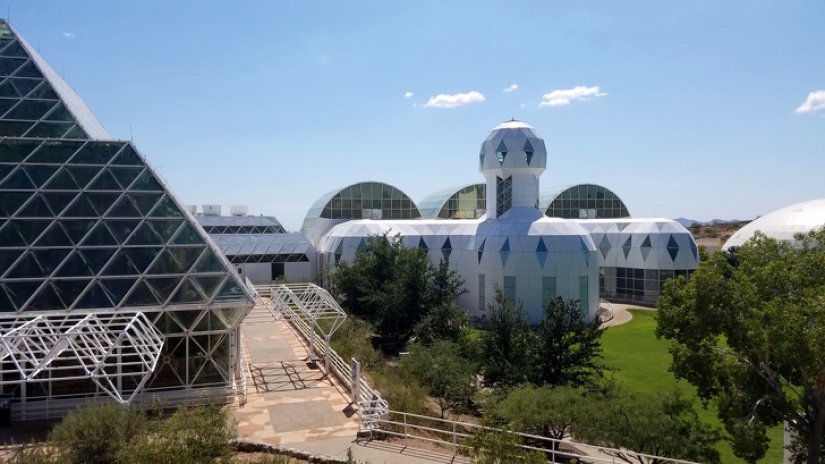
All this splendor is located 50 km from the nearest settlement in a protected area, where it was impossible to get there without the permission of the Bass. The construction of the complex was taken seriously — in 1987, the first stage of the pavilions was erected, which were completely sealed.
There were 180 tons of air under the sealed dome and its intake from the outside was excluded using effective seals. This was necessary so that during the two years of the experiment it was possible to record changes in the quality and quantity of breathable air in the internal volume.
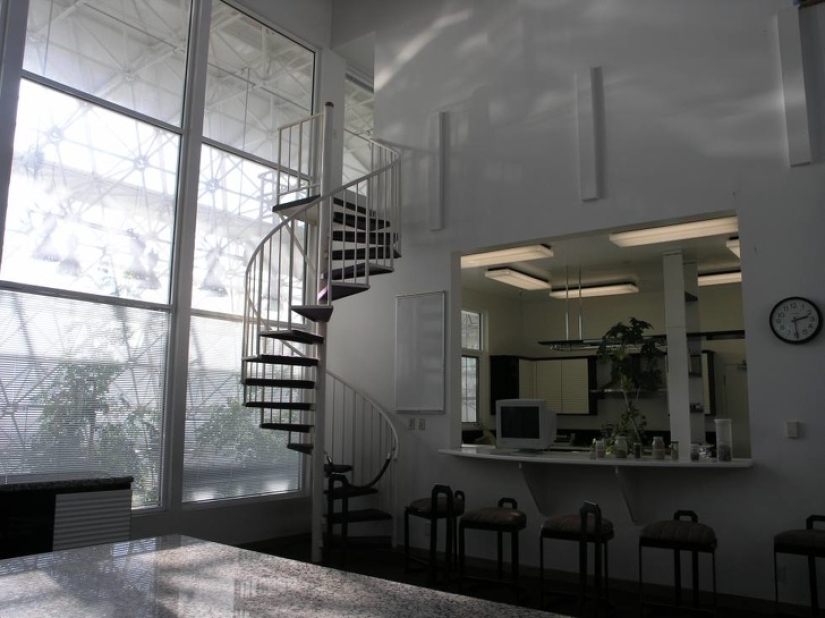
Residential premises of the complex
All technological systems and communications were hidden underground, so as not to take up space in the pavilions of Biosphere-2. By the way, the buildings were also isolated from the ground, for the purity of the experiment. Steel sheets with a total weight of 500 tons served as the floor of buildings, on which the biotopes themselves were created.
Different areas were allocated for natural locations. The "ocean" with an artificial coral reef occupied 450 square meters, and fields and vegetable gardens covered an area 6 times larger. Such an uneven distribution was due to considerations of expediency — the ocean was almost useless, and the fields gave the inhabitants of the "Biosphere-2" food. Another reservoir, but already useful, was a freshwater pond, into which several species of fish were launched.
According to the authors of the project, the colonists had to eat what would grow under the domes, breathe the air that the plants would produce and drink water that would be in a natural cycle. In a word, the artificial ecosystem was supposed to become a small analogue of the planet Earth, with a population of eight people.
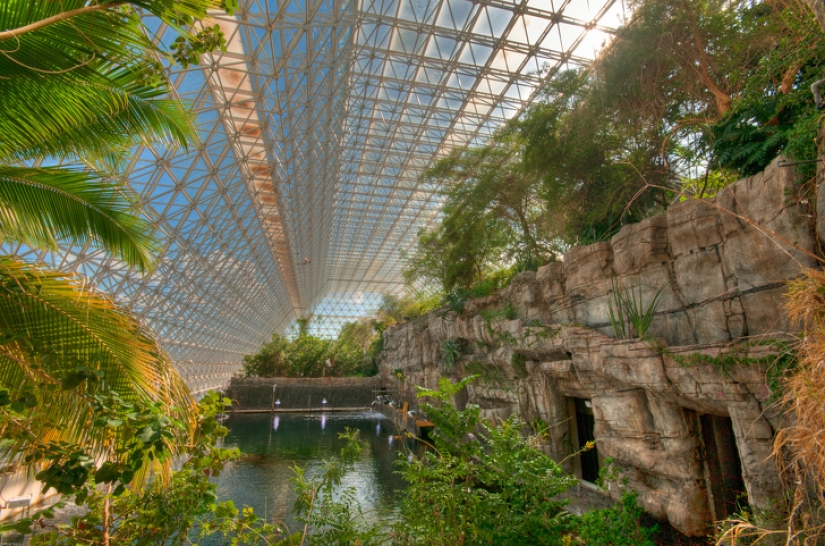
Ocean Biome today
On September 26, 1991, eight volunteers entered the dome of Biosphere-2. They were dressed in identical overalls, almost like astronauts, and they were smiling happily. Their photos flew around hundreds of publications of the planet and millions of people learned about a fantastic experience on a large scale that can give hope to humanity.
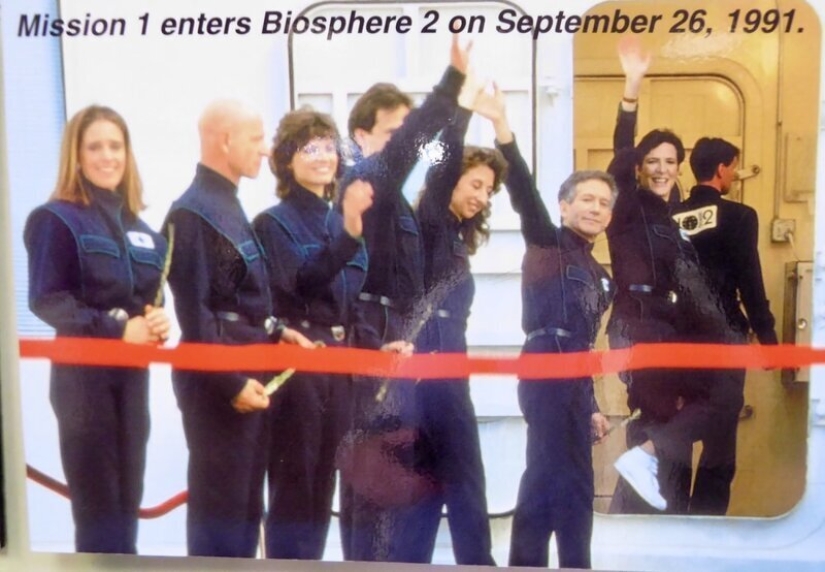
The experiment started and at first everything went according to plan. The colonists worked in the fields, tended cattle, swam in the "ocean" and monitored the state of their little paradise. In the evenings, they chatted on various topics, played board games or played music on instruments that they had brought with them from the "big world".
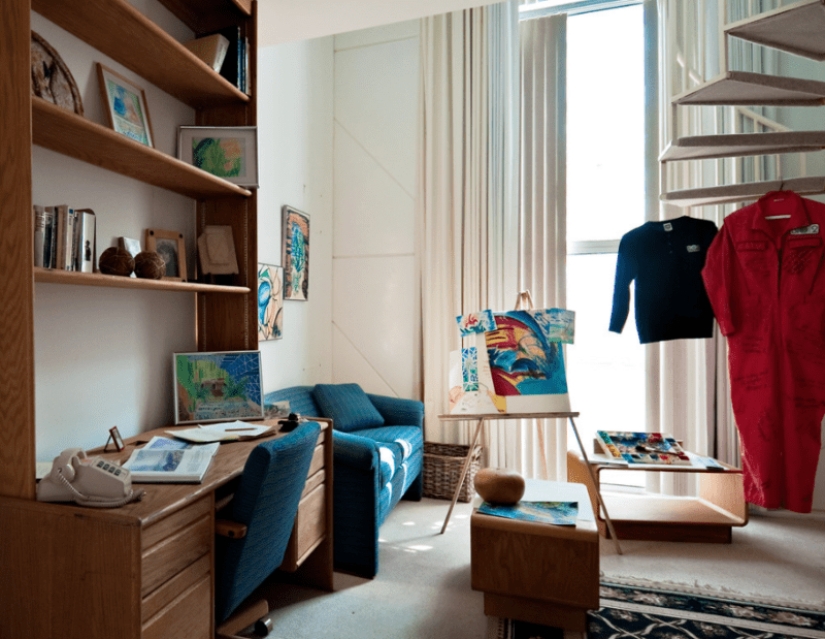
The room of one of the colonists
Tillo made new calculations that showed that in just a year life in the "Biosphere-2" will become impossible and all living things in it will die. The imbalance in the atmosphere soon began to create problems for the participants of the experiment. Because of it, microorganisms began to actively multiply in the fields of the colonists, destroying the lion's share of the crop.
All that the residents of the complex could do was to increase the green mass, in the hope that an acceptable level of oxygen would be restored. They began to actively plant plants and launched carbon dioxide-absorbing equipment at full capacity. But all efforts were in vain and the air became less suitable for breathing every day.
Soon it was necessary to break one of the basic rules, which stated that during the experiment, none of the colonists should go outside the complex. Team member Jane Poynter, while operating a rice peeling machine, accidentally cut off the tip of her finger and had to be evacuated to the hospital. Having received the necessary medical assistance, the colonist returned to the dome of the complex.
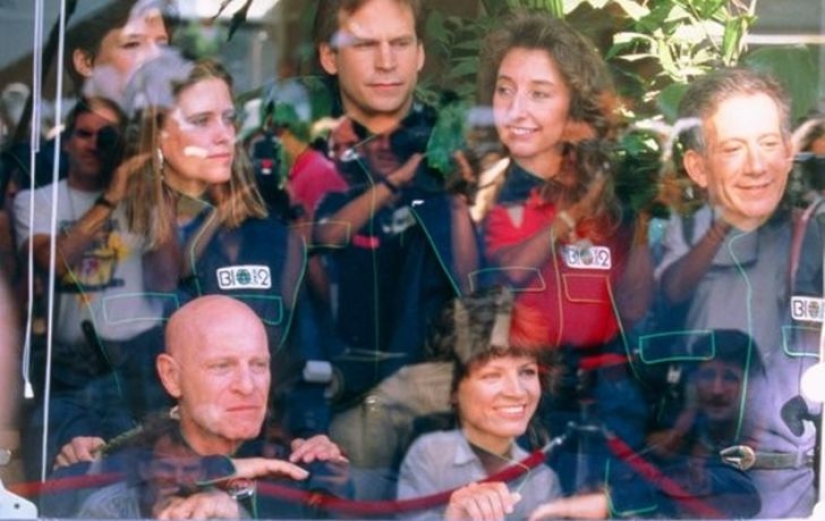
As it turned out, this is just the beginning. It soon became clear that scientists, calculating the "Biosphere-2", made a mistake in one more calculation. 20 acres of the "household plot", on which the participants of the experiment grew agricultural products for themselves, were unable to provide enough food for eight healthy adults.
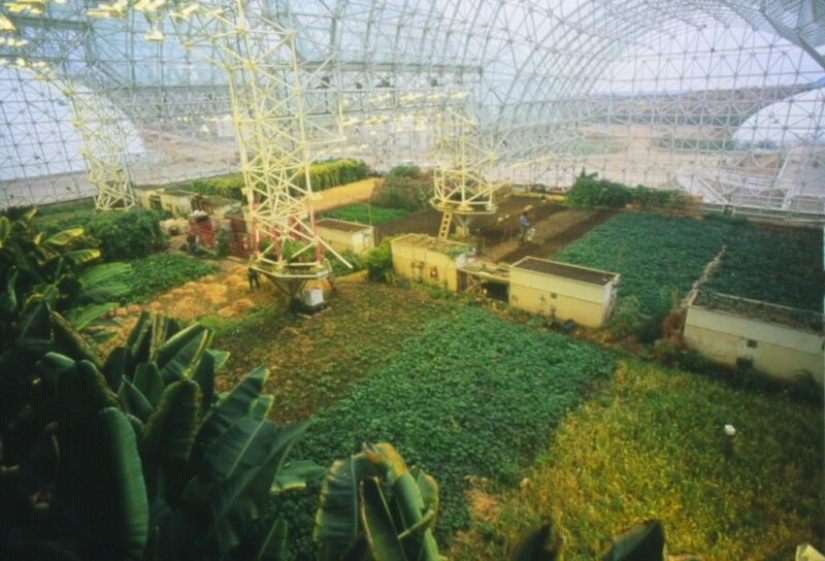
Vegetable gardens that were supposed to feed the colonists
Philosophical conversations and choral evening singing stopped in the colony — all the conversations were only about food and often the conversations ended in scandals and mutual accusations. At first, the residents of the complex had to arrange buffets, replacing full-fledged breakfasts and lunches with snacks, but the time came when food began to be given out in meager portions, weighing on the scales.
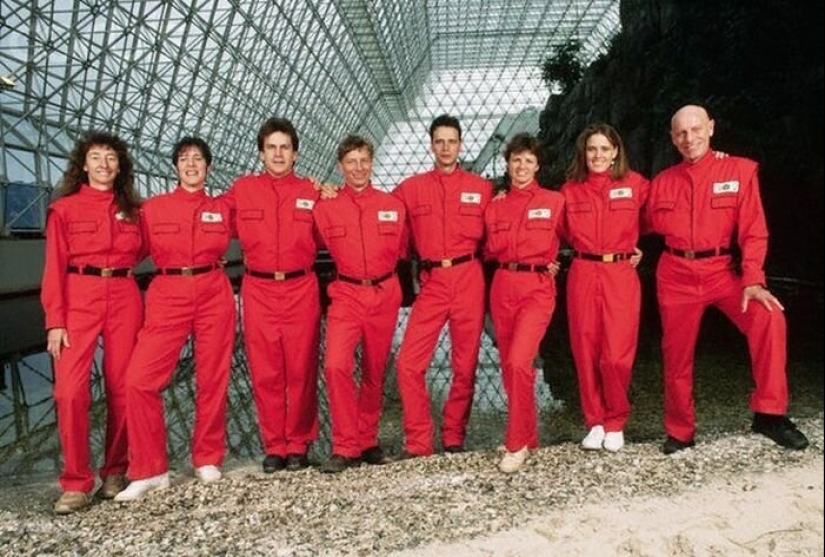
Very soon, the once close-knit team was divided into two groups. Some colonists quarreled so much that they began to go to the dining room and to the fields at different times, so as not to overlap there. Although the medical indicators of all participants in the experiment were better than before the experiment began, they did not feel well and this was a purely psychological factor.
A year after the launch of the Biosphere-2 project, it became almost unbearable to be in the pavilions. Pests destroyed almost all rice crops and people ate beans, carrots and sweet potatoes. The "carrot" diet soon made itself felt — due to an overabundance of beta-carotene, the skin of the residents of the "ark" took on an orange hue. They could diversify their diet with meat, eggs and milk only once a week and the portions of the coveted food with animal proteins were simply ridiculous.
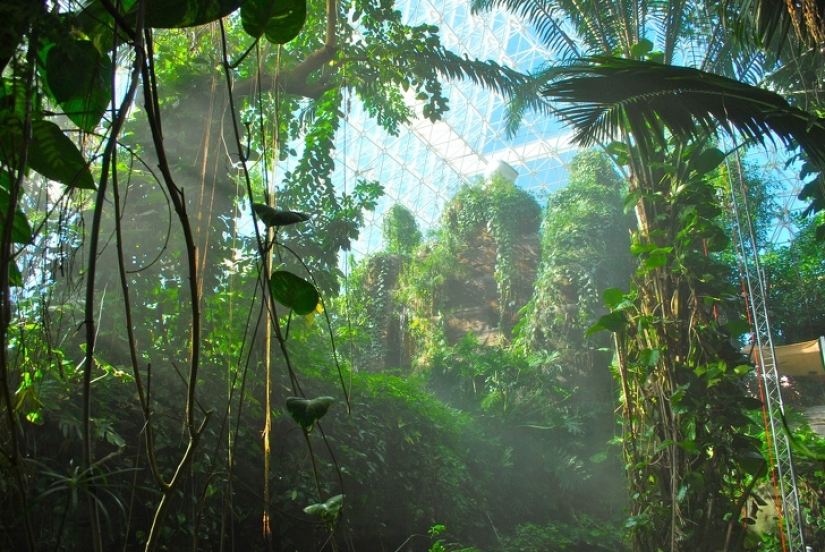
Biome "Jungle" today
Meanwhile, chaos began in the indoor world. The desert was the first to die — due to the high content of carbon dioxide in the air, the humidity regime was violated and water began to accumulate under the dome. It fell in a continuous rain on the sandy ground and the desert plants died very soon.
In 16 months, the oxygen content in the pavilions was reduced to 14 percent and all biomes, except for the jungle, were in a deplorable state. Tropical greenery was rampant and thanks to it, bacteria began to multiply catastrophically quickly in the pavilion with wet forests. They also consumed oxygen, of which there was less and less for people and animals.
Now people have already physically begun to feel oxygen starvation. They became sluggish, and also complained of memory impairment. Some colonists had to pause in the conversation to remember forgotten words and catch their breath. Because of the danger to health, scientists decided to change the rules and start feeding air outside the dome.
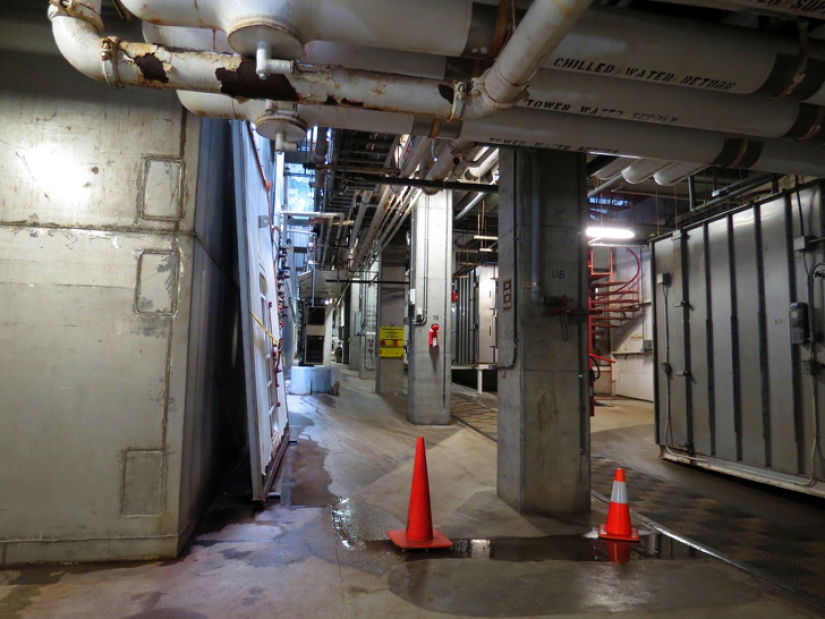
The basement of the complex
This was kept secret from the journalists and the whole world still thought that the fantastic experiment in the Arizona desert was successfully continuing. In September 1993, exactly two years after the start of the Biosphere-2 experiment, the exhausted colonists left their inhospitable, suffocating world and went out into the fresh air.
Jane Pointer, the one who injured her finger, described her impressions of going outside:
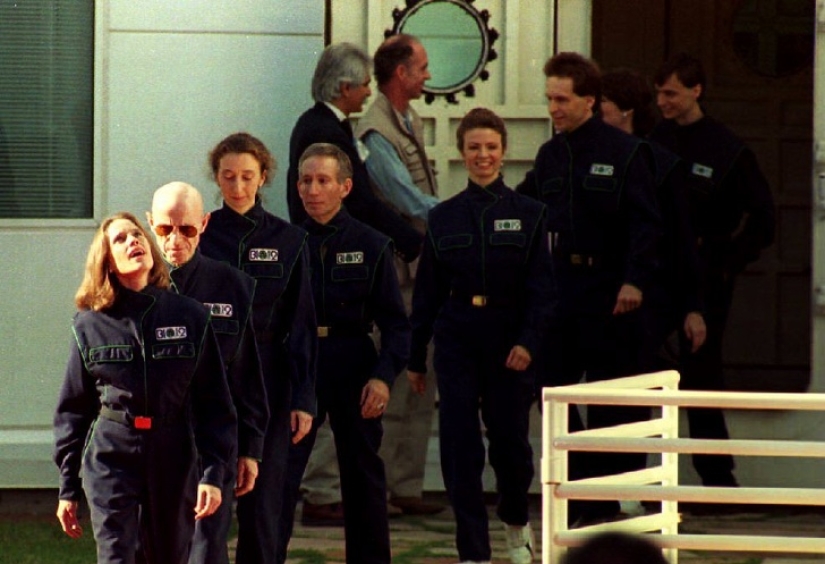
The participants of the experiment leave the "Biosphere-2"
The experiment with a stretch was recognized as successful, but it was decided to repeat it a year later. The second group of volunteers, who entered the dome to spend 10 months there, had no luck from the very beginning of the mission. First, two participants excluded from the team broke into the pavilions, who depressurized the system for 15 minutes, opening emergency exits and breaking several windows.
Because of this, several colonists were disappointed in the project and expressed a desire to leave the complex immediately. Seeing that the experiment did not go well from the very start, the sponsors refused to allocate money for its continuation and the mission ended there.
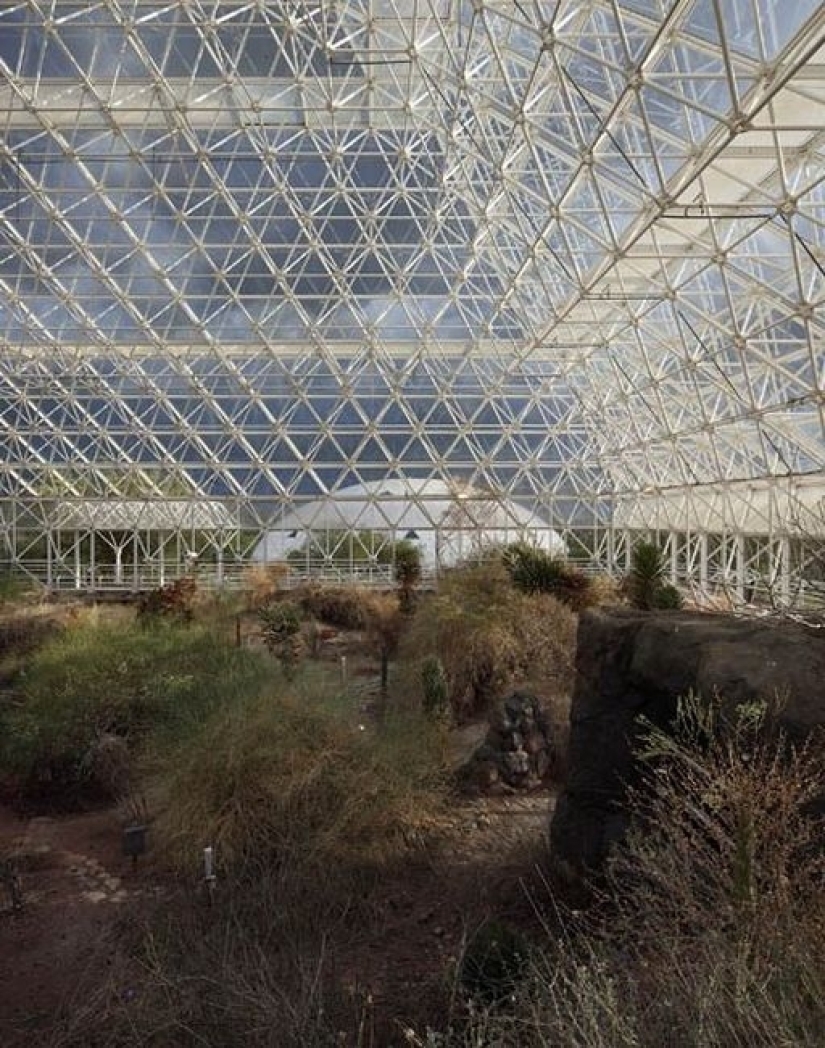
The result of the large-scale experiment "Biosphere-2" was as follows: despite all the calculations and efforts, people under the dome could not live without an influx of air from outside. The psychological factor also made itself felt — people could not stay in a closed space for a long time without scandals, even if it was solid in size. Even years after the end of the experiment, its participants refuse to communicate with each other.
The fantastic complex "Biosphere-2" still stands in the middle of the Arizona desert. It was transferred to the local university and now there is a botanical garden under the dome. Sometimes experiments are carried out here, of course not as large-scale as in the 90s of the last century.
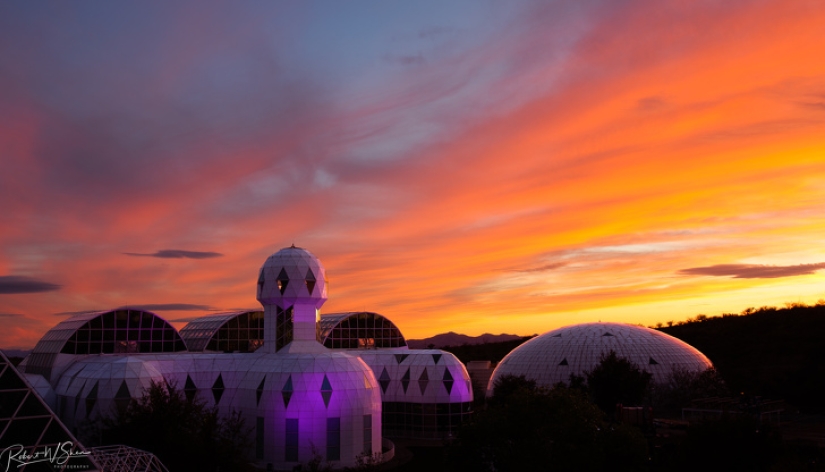
"Biosphere-2" is loved by tourists, to whom the guides tell in detail the story of the" little paradise " that turned into hell. Also, guests must be shown an inscription made on one of the dome structures by a colonist from the first batch:
Reading this simple message, you begin to understand how fragile our world is and how important it is to preserve it so that you do not have to move under the dome, where absolutely nothing good awaits people.
Keywords: Arizona | Biology | Oxygen | Colony | Equipment | Failure | Plants | Experiment
Post News ArticleRecent articles

Most of us think that the color of the eggshell does not play any role and it is possible not to pay attention. But it's not and ...

The more we rely on technology, the more potential power hackers gain over us. It doesn't matter if their goal is to help or cause ...
Related articles

The confrontation of European settlers with the indigenous people of the Americas lasted for almost five centuries. And with the ...

Woodpeckers — amazing birds over that pretty bother mother nature. All day they are able to peck their beaks wood, exposing ...

Hypoxia & # 8212; lack of oxygen in the blood. Today, this problem is especially relevant because of the coronavirus, but ...

Creating a good portrait is one of the most difficult tasks for any photographer. In order to make a really natural and memorable ...